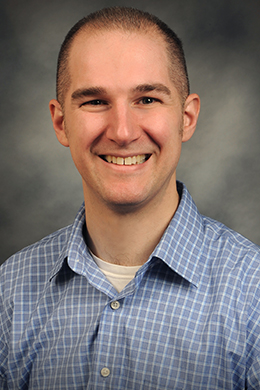Aaron E. Schirmer
 Why did you choose Northwestern?
Why did you choose Northwestern?
I had been working as a research technologist in the University’s Center for Functional Genomics for two years. I really enjoyed the work and my labmates. For graduate school, I was interested in continuing in my laboratory and asking similar research questions. Joining the Northwestern Interdepartmental Neuroscience (NUIN) PhD program was an easy choice.
How would you describe your research and/or work to a non-academic audience? What was it then and/or what it is now?
My research focuses on the study of circadian rhythms and the effect that these rhythms have on animal (including human) behavior and physiology. Circadian rhythms are daily oscillations that serve to coordinate an organism with its external environment. Examples of circadian rhythms are phenomena such as sleep-wake cycles, oscillations in core body temperature, and hormone cycling. These rhythms are significant because they allow the organism to anticipate and adapt its behavior and physiology to changing environmental conditions. The ongoing work in my laboratory utilizes a variety of techniques (molecular, physiological, and behavioral) and experimental systems (both vertebrate and invertebrate) to investigate: (1) The impact of environmental perturbations, such as photopollution and social jetlag, on mammalian and invertebrate circadian systems, (2) The role of circadian rhythms in the modulation of appetitive and breathing behavior in praying mantis, and (3) The molecular genetic mechanisms involved in the regulation and expression of circadian rhythms in the brain and peripheral tissues.
Tell us who or what inspired your research and/or work.
Much of my current research has been inspired by conversations or interactions with students. For example, my research into the impact of photopollution on urban mammals began with a conversation between myself and a student on how environmental light influences the circadian clock.
What are you most proud of in your career to date?
In 2018, I published a paper in the highly ranked journal Scientific Reports. This article garnered international attention and is currently ranked in the top 1% of the 281,668 articles of a similar age in all journals tracked by Altmetric (an online tool to measure the impact of scholarly content). Our research was also featured in the journal’s top 100 most downloaded articles in 2018 and on over 75 other international news outlets including the BBC Newshour radio program, CanadaTV news, Reddit front page, Reuters Health, Yahoo, The Telegraph, ScienceDaily, Slate, US. News and World Report, and Inside Higher Ed.
Tell us about a current achievement or something you're working on that excites you.
This past fall I was nominated by a colleague and chosen as a finalist for the Bernard J. Brommel Distinguished Research Professor Award at Northeastern Illinois University (NEIU). This is NEIU's top research prize and I am one of four finalists selected from the entire university. I am extremely honored to be considered as a finalist.
What advice would you give your younger self or someone considering a similar path?
Take opportunities when they are presented to you. Get as much experience as you can and keep an open mind. Collaborations and new research questions are everywhere.